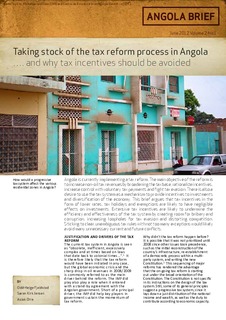| dc.contributor.author | Fjeldstad, Odd-Helge | |
| dc.contributor.author | Jensen, Søren Kirk | |
| dc.contributor.author | Orre, Aslak | |
| dc.date.accessioned | 2018-01-04T08:17:27Z | |
| dc.date.available | 2018-01-04T08:17:27Z | |
| dc.date.issued | 2012-06-05 | |
| dc.identifier | oai:www.cmi.no:4477 | |
| dc.identifier.citation | Bergen: Chr. Michelsen Institute (Angola Brief vol. 2 no. 1) 4 p. | |
| dc.identifier.issn | 1892-3933 | |
| dc.identifier.uri | http://hdl.handle.net/11250/2474755 | |
| dc.description.abstract | Angola is currently implementing a tax reform. The main objective of the reform is to increase non-oil tax revenues by broadening the tax base, rationalize incentives, increase control with voluntary tax payments and fight tax evasion. There is also a desire to use the tax system as a mechanism to provide incentives to investments and diversification of the economy.
This brief argues that tax incentives in the form of lower rates, tax holidays and exemptions are likely to have negligible effects on investments. Extensive tax incentives are likely to undermine the efficiency and effectiveness of the tax system by creating room for bribery and corruption, increasing loopholes for tax evasion and distorting competition. Sticking to clear, unambiguous tax rules with not too many exceptions would likely avoid many unnecessary current and future conflicts. | |
| dc.language.iso | eng | |
| dc.publisher | Chr. Michelsen Institute | |
| dc.relation | Angola Brief | |
| dc.relation | 1 | |
| dc.relation.ispartof | Angola Brief | |
| dc.relation.ispartofseries | Angola Brief vol. 2 no. 1 | |
| dc.relation.uri | https://www.cmi.no/publications/4477-taking-stock-of-the-tax-reform-process-in-angola | |
| dc.subject | Angola | |
| dc.title | Taking stock of the tax reform process in Angola, and why tax incentives should be avoided | |
| dc.type | Report | |
